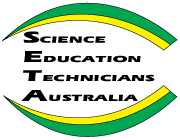I am very grateful to have been given the opportunity to attend CONASTA 71 held in early July 2024 in Melbourne. This was made possible by the generous sponsorship of MTA (Modern Teaching Aids), SETA (Science Education Technicians Association) and support from my workplace, Launceston Christian School.
It was a fantastic experience and I feel so privileged to have attended this wonderful event.
The organising team from ASTA (Australian Science Teachers Association) and STAV (Science Teachers Association of Victoria) worked tirelessly to make it all happen and run so smoothly. The conference was a credit to their dedication and hard work.
The venue at the University of Melbourne was a terrific location, with high quality presenters and very informative workshops. Various buildings and lecture theatres were used around the campus. This included Melbourne Connect where we were served amazing food and coffee, while we browsed through the Exhibitors Expo of science suppliers, tour providers, publishers, and other science education organisations. They all gave so willingly of their knowledge and expertise, with lots of flyers, pens and give-aways thrown in. A fantastic venue with superb catering!
As it was NAIDOC Week, great thought had been put into several topics presented from an Indigenous perspective. One keynote speaker gave us challenging insights into the impact of bushfires in Australia and the benefits of aboriginal fire burning in maintaining a safer landscape. It was very thought provoking to hear how science permeates so much of Australian indigenous culture. A second keynote speaker enlightened us on his research into indigenous astronomy and how this ancient knowledge of predicting lunar eclipses, etc. has been passed down through the generations.
Other keynote speakers shared with us from their knowledge of education in Australia in comparison to other countries, the teaching of science into the future while bringing improvement today, and sustainability. It was a privilege to hear them all and they gave me much to think about for the future. ASTA hosted a forum discussion panel with some high-profile speakers, followed by workshops on several important science topics for the future.
I took part in the ‘What ethics and values should be promoted in school science? Our small group came up with lots of ideas to pass on to the panel for consideration.
I was fortunate to take part in some great workshops during the conference. One was a project in its early stages of research looking into growing plants in space, and the engineering challenges of this ground-breaking work. At others, I heard about forensic science being used by Victorian Police Force (organised by SETA), using nano aquaria for classroom ecological investigations, and using paper Origami models in the teaching of dissections. All were wonderful and I enjoyed them immensely! They’ve given me lots of information to share with colleagues at my school.
I also visited the Melbourne Museum and Melbourne Zoo, which were both so incredible.
I met some wonderful people who so willingly shared their knowledge and insights and made some new friends. This opportunity has given me renew vigour in my role as a laboratory manager in education. For that I am most grateful!
I’d certainly encourage others to enter the STAR Week competition run by SETA and generously sponsored by MTA.
You might just get to go to CONASTA 72 in Western Australia in 2025!
Maree Lawes, Launceston, Tasmania
